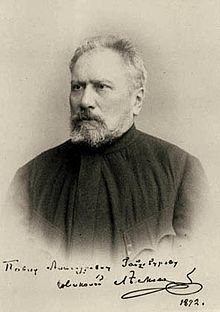A winter day
A Winter's Day ( Russian Зимний день , Simni den ) is a story by the Russian writer Nikolai Leskow , which appeared in the September issue of the Moscow magazine Russkaya Mysl in 1894 .
This prose piece - written down like a chamber play - is said to be blurred, with due regard for the censorship. For example, questions remain unanswered about Uncle Luka, whose inheritance is also at issue.
Reissner wrote in 1973 that the reader gains "the impression of a whole web of corruption, spying, intrigue, fraud and crime, which gets its special accent through the erotic relationships between the actors ...".
Leskov was inspired by a scandal over a forged will of the millionaire VI Gribanov.
content
Leskow provides the framework for the discussion: “A winter's day in the north with a slight thaw. Two o'clock in the afternoon ... In a second-level reception room ... the woman of the house and a visitor are sitting across from each other. "The former is 65 years old, the other" looks like a doe ", is younger, but withered. Both move over Lidija, the niece of the landlady. The 25-year-old apparently slumbers behind a flower stand, but apparently partly listens. The landlady knows how to tell the rather prudish visitor that her 70-year-old brother Luka is fond of the prospective field shearwoman Lidija. The tender brother wants to make Lidija the sole heir of his fortune. In that case Arkadi and Walerian, the sons of the landlady, would go away empty-handed. Luka no longer receives his sister and her two sons.
Lidija, who finally finishes her afternoon rest, pretends to be an emancipated young woman. She doesn't believe in marriage.
A general with the first name Sachar, the brother of the landlady, appears and talks to the prudish visitor in private. Sachar, who had an affair with the visitor twenty years ago, is constantly being blackmailed by the lady; in turn gives her a larger sum of money. Sachar complains to the visitor. It is not acceptable that she should send her now seriously ill, then horned husband - who knows about the general's treacherous notebook - to blackmail. When the general has left, Walerian appears and takes the new cash from the visitor who is counting money. The visitor likes to have the money stolen. She wants to go home as quickly as possible and humble herself in her home in front of Walerian. Leskow describes the visitor: “... her face was reminiscent of the sniffing snout of a bitch in heat. She guessed that she was repulsive at that moment and pulled the veil over her face. "
The landlady knows what is being played. She advises her son Walerian to get hold of the notebook in the visitor's apartment, the contents of which Uncle Sachar is so afraid of. If Walerian succeeds in the coup, the landlady hopes for another open door with her brother Luka. Walerian waves it away. He found out in the responsible notary's office that Lidija waived. Uncle Luka now wants to work charitable.
The text ends in two sexisms. "Leskow switches over to the servants' room": The landlady goes out and the 45-year-old tall, very blonde cook first lures the 13-year-old errand boy into her room and ravages him. Second, the house maid despises Walerian and yet enjoys his virility to the full. The female servants accept possible pregnancies without hesitation.
reception
- Setschkareff cannot discover any action. The relationships between the dialogue partners only emerged from the narrative fog over time. And Leskov does not attack his friend Tolstoy in the text , but only the Tolstoyans . On the sexisms, Setschkareff remarks: "It seems that this concentrated eroticism can be ascribed to a certain influence of Maupassant ...".
literature
German-language editions
Output used:
- A winter day. Landscape and genre. German by Georg Schwarz. P. 326–396 in Eberhard Reissner (Ed.): Nikolai Leskow: Collected works in individual volumes. The valley of tears. 587 pages. Rütten & Loening, Berlin 1973 (1st edition)
Secondary literature
- Vsevolod Sechkareff : NS Leskov. His life and his work. 170 pages. Verlag Otto Harrassowitz, Wiesbaden 1959
Web links
- The text
- Entry in the Laboratory of Fantastics (Russian)
- Entry in WorldCat
Individual evidence
- ^ Reissner in the follow-up to the edition used, p. 564, 11th Zvu
- ^ Reissner in the follow-up to the edition used, p. 564, 9th Zvu
- ^ Reissner in the follow-up to the edition used, p. 564, 8. Zvo
- ↑ Edition used, p. 326, 11. Zvo
- ↑ Edition used, p. 377, 10. Zvo
- ↑ Setschkareff, p. 153, 8. Zvo
- ↑ Edition used, p. 396, 9. Zvo
- ↑ Setschkareff, p. 152
- ↑ Setschkareff, p. 152, 5th Zvu
